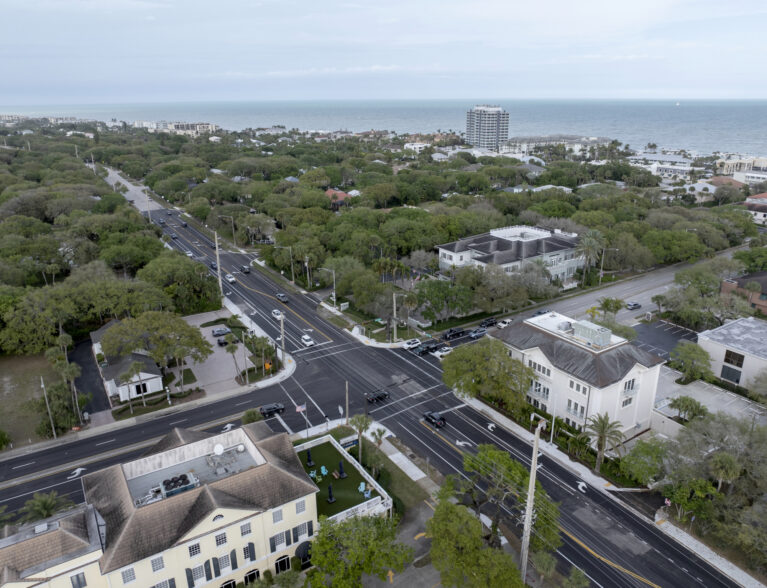
After a year-and-a-half of what seems to have been slow-paced road work and the expenditure of $5.6 million, the so-called “roadway improvements project” on the stretch of State Road A1A between Beachland Boulevard and the 17th Street causeway is nearing completion.
But is the island’s main drive better, or safer?
Some residents are still not convinced the project represents any improvement at all, and even argue that, at certain locations, that stretch of A1A is even more dangerous now for motorists and pedestrians alike.
The project is at present “90 percent completed,” says Florida Department of Transportation District Four spokesperson Melissa Simons. She added that a contractor is now adding the “final friction course asphalt,” a job that must be coordinated with similar work by the same contractor at the intersection of U.S. 1 and 8th Street.
“Once the milling and resurfacing work is completed,” Simons said, “there is a two-week curing period before the contractor will install thermoplastic pavement markings throughout the project limits.”
All of which means that the last of the orange barrels should be picked up and the two seemingly abandoned port-a-potties across from the Quail Valley River Club grounds should finally be removed by May of this year. Simons said May was the scheduled completion date of the project, meaning that according to FDOT, the work which began in August 2022, will have been done on schedule, “pending possible further weather delays, holidays and unforeseen circumstances.”
The project involved repaving and restriping the entire roadway, creating a seven-foot buffered bicycle lane, adding a six-foot sidewalk on the east (ocean) side of the road, upgrading drainage, bringing curb ramps up to standards to meet Americans with Disabilities Act (ADA) requirements, as well as adding two pedestrian crossings in the Central Beach area.
Despite the addition of the crosswalks to enable people crossing from Riverside Park, the museum and the theater to the beach area, or vice-versa, with a little more protection from motor vehicle traffic, last week several pedestrians were observed crossing the road – without incident – in the middle of some of the Central Beach blocks and far from the crosswalks.
To the surprise of some residents, the two new pedestrian crosswalks have different configurations.
Going southbound from Beachland Boulevard along A1A, the first crosswalk is a pretty simple affair, with a warning sign on the side of the road and stripes painted across the roadway. However, the second one further south at Iris Lane has a raised island in the middle of the roadway so slow-footed pedestrians can pause halfway across the road if needed.
One resident who asked that his name not be used said that the crosswalk was unneeded because he has never seen more than a couple of pedestrians cross the road at that point.
And he said the addition of the hefty concrete island in the center turn lane has made the road more dangerous for motorists.
“Woe betide the northbound driver who, on a dark night, wants to make a left turn into Iris and enters the center lane too soon,” he said. “Many man-hours and expense have been spent to make this section of A1A ugly and dangerous. Crews have been working hard to make a joke out of the street.”
Another issue that has put the FDOT planners at odds with some of the locals is the addition of the curved, winding sidewalk on the east side of the road. Last week, golf carts were observed trying to navigate around the sharper curves with considerable difficulty.
FDOT said the sidewalk was designed to be winding not to prevent golf carts and fast cyclists from using it, as had been speculated by some residents, but to “minimize impact on existing landscaping,” enabling work crews to leave trees alone.
But the resident critical of FDOT’s work disputed this. “Almost all the trees on the east side were sheared off,” he said. “And pedestrians don’t use it – they walk on the west (lagoon) side where the sidewalk is straight.”
With the impending completion of the A1A road improvements project in the Central Beach area between the bridges, island motorists who depend on the island’s main thoroughfare to get anywhere from their homes – or homeowners using the sidewalks for a stroll – are not quite out of the woods yet.
Farther north along A1A into the Town of Indian River Shores, sidewalks have been dug up and many pipes are sticking out of the ground along the west (lagoon) side of the road as crews for Florida City Gas complete the infrastructure necessary to bring natural gas to the area.
And the 17th Street bridge rebuilding project, which has limited traffic to and from the barrier island to one lane in each direction and caused extra congestion on the Merrill P. Barber bridge, is scheduled to be with us for at least another three years.



